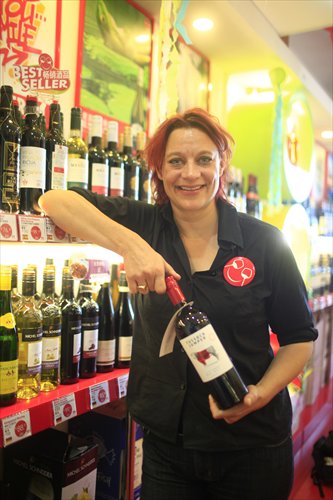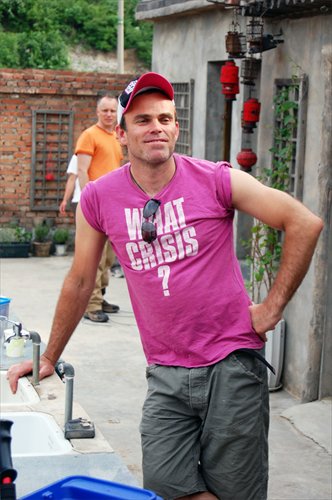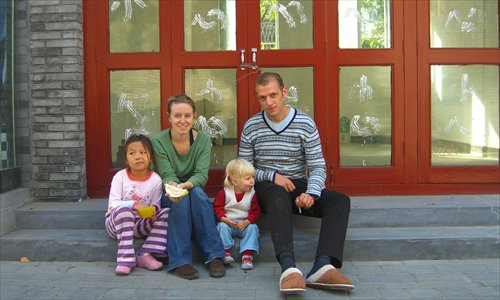Meager beginnings transformed into fortune for foreign entrepreneurs in China

Claudia Masueger brings her family's wine knowledge from Switzerland to open the wine retail chain CHEERS Wines in Beijing. Photo: Li Hao/GT
When Claudia Masueger, from Switzerland, came to China in 2008, all she had was two suitcases of wine samples.
Now she owns a wine retail chain, CHEERS Wines, that consists of 40 chain stores, with almost two new stores opening each month.
According to her, China is a land of opportunity for foreigners who want to make it big with little or nothing to start with.
"We should never underestimate the price of living in China, but there are so many ways to thrive without much money, if you are willing to."
Masueger, 44, led a simple life in Beijing. She knew this could eventually pay off since there are so many business opportunities and people could live on a small budget while trying to launch a business. Her ability to throw caution to the wind and choosing to live by her heart is what drives her forward; she does not want to take the safe way out.
Beijing is a thriving business hub for foreign adventurers, and it has become home to a number of successful entrepreneurs. These business owners have made it, despite their lack of financial support and resources from the start. For those who don't arrive with a diploma in one of the hottest fields, or a senior management job, starting from scratch may be the best option.
Metropolitan tells the stories of three such expat business owners, and how they built successful thriving business from the ground up.

Jade Gray from New Zealand now owns three food & beverage brands in China. Photo: Courtesy of Jade Gray

In the 1990s, Dominic Johnson-Hill (right) and his family invested all the money they owned in the very first shop of the Plastered T-Shirts. Photo: Courtesy of Dominic Johnson-Hill
Surviving in Beijing with little
Masueger's way to the top was learning and adapting to the local market, and being diligent in her endeavors.
As soon as she arrived, Masueger started traveling throughout China by bus and train, duiring which time, she compiled research.
She spent her time visiting bars, restaurants, retailers, distributors and importers. She even gave a spontaneous wine tasting on the street. After a couple of months, while researching the market, she became an agent between suppliers and importers.
After a few challenging but successful large orders, Masueger had the foundation to start MQ Wines, a B2B wine wholesale business that worked with distributors and retailers.
"The business was not exciting then," she said. "The distributors didn't have any knowledge about wines, and most of the customers were government and business people."
In addition, there were several cases where the business almost failed.
In November 2010, the warehouse burnt down and operations came to a halt for four months until the insurance money came through.
During the crisis, she decided to take a different approach, gearing her business toward China's younger generation, and selling wine for lower prices directly to the customers. This is when CHEERS Wines was born.
Another major crisis came for Masueger when competitors tried to poach her staff and copy her business model. "Once, I almost lost 50 percent of my staff," she said.
But Masueger managed to survive while most of her competitors didn't.
With her family having been in the wine business in Switzerland for generations, wine knowledge is her strength. Masueger is able to find and bring the best wines to the Chinese market. On top of a large number of wine choices, Masueger and her team also offer wine lessons, videos, events and tastings almost every day. Profits were invested in training and opening new stores, and the brand started expanding.
Finding a spot in China
Although Dominic Johnson-Hill, 40, came from a rich family in the UK, he chose to build his business from scratch in China. After the initial years of struggling, his local fashion brand Plastered T-Shirts is expanding and making large profits.
Young Johnson-Hill lived in a big house in the UK and went to elite boarding schools. After high school, with the money he saved from working part time, he traveled to Africa, India and ended up in China.
At the beginning, the successful fashion business he owns today was full of risks. In 2003, with a child to support and a pregnant wife, their total wealth was 30,000 yuan ($4,486) and he invested it all in starting up a store on Nanluoguxiang in Dongcheng district.
"As an expat living in Beijing, starting a new business locally is pretty scary, especially if you have a child and a pregnant wife. It was a big gamble," he said.
Business in the first year was tough and the family had to lead a simple life with only his wife's salary of 15,000 yuan a month to rely on. But Johnson-Hill cherished the initial stage of his entrepreneurial adventure.
"We lived a very local life. Our daughter went to a local school and we ate local food. We were very, very happy."
Prior to the fashion brand, he had a few other start-up attempts, including a market research company and a small language school, neither of which made much money.
The success of Plastered T-Shirts, according to him, lies in finding his spot in the local business scene.
"What I do is creative artwork that celebrates Beijing. I was the first to enter this specific market," he said.
The business allows him to combine art, design and his insight as a foreigner living in China for a long time.
"I almost had no competition," he said. "I don't believe that I would have done well if I got into an industry that was very competitive with a lot of Chinese businessmen."
Intending to grow his business slowly and organically, Johnson-Hill has great faith in the retail sector in China.
"Our revenues have grown by almost 10 percent every year, for the last four years. When we open a fourth store, it should grow even more."
Built to last
When Kiwi Jade Gray arrived in China back in 1996 at the age of 20, he worked on a cattle farm in a small village in Tieling, Liaoning Province.
The first few years were tough. As the farm manager, he was in charge of 200 imported Black Angus cattle. "It was the hardest year of my life," he said.
His team of Chinese workers were mostly local kids and seniors. As one of the only two foreigners in the city (the other being a teacher in the city's university), he felt lonely and was determined to leave Tieling for Beijing.
Now Gray is the founder of a food & beverage group consisting of Lush café and bar, Gung Ho! Pizza and Pyro Pizza restaurant chains in Beijing. His business have grown to eight stores and almost 200 employees. From humble beginnings and two decades of entrepreneurial endeavors, Gray has expanded his businesses both inside and outside of Beijing.
Gray's first start-up endeavor was Fusion Fitness, a gym chain he founded with a Chinese partner in 1999 at Wudaokou, Haidian district. Right when the business started to take off, SARS (severe acute respiratory syndrome) came along and became the biggest crisis he has experienced as an entrepreneur.
"Almost all our members, most of whom were foreign students, left China," he said.
That was when he left the gym business, entered the food & beverage industry and opened Lush.
"I learned that the most important thing for an entrepreneur is persistence. I was angry, upset, and scared. [But] I realized that China is my home. I realized that I had a company, employees, a dog and a home here."
Gray always knew that instead of getting a job at a big international company, he wanted to build businesses of his own. With both of his parents being entrepreneurs, he believes entrepreneurial blood runs through him.
A land of opportunity
Gray believes China is a very good place to start from scratch, due to its big market and numerous opportunities. However, he pointed out that with bigger opportunity, comes higher risks.
"I think it's easy to get into the market because costs are much lower compared to the West. The risk is still very high, especially when you are just starting, because there are so many areas you need to research. It's a classic situation of risk and chance," he said.
For those who are thinking of building their own business from scratch in China, Gray advises them to understand market changes and to try to be flexible.
One example is the huge market for fruit pizza in China. When Gray realized that, he started creating different types of fruit pizza, despite the fact that he did not think fruit pizza is real pizza in the West.
Johnson-Hill agrees that China is a "playground for entrepreneurs."
"You can absolutely start a business without much money," he said. "I never cease to be surprised by how business is done in China. Everything changes every day."
Even with a low income and no connections in China, Johnson-Hill still describes the first few years of having a start-up as one of the happiest periods in his life.
"I didn't have a lot of money or possessions, but it was a big adventure," he said. He lived with Chinese families, taught English and did everything he could to earn money.
"You are competing against some of the finest business people in the world, in a foreign land. So you really have to fully apply yourself," he said. "It brings out the best in you and what you are capable of doing."
Huang Yiran contributed to this story
Newspaper headline: A piece of the pie